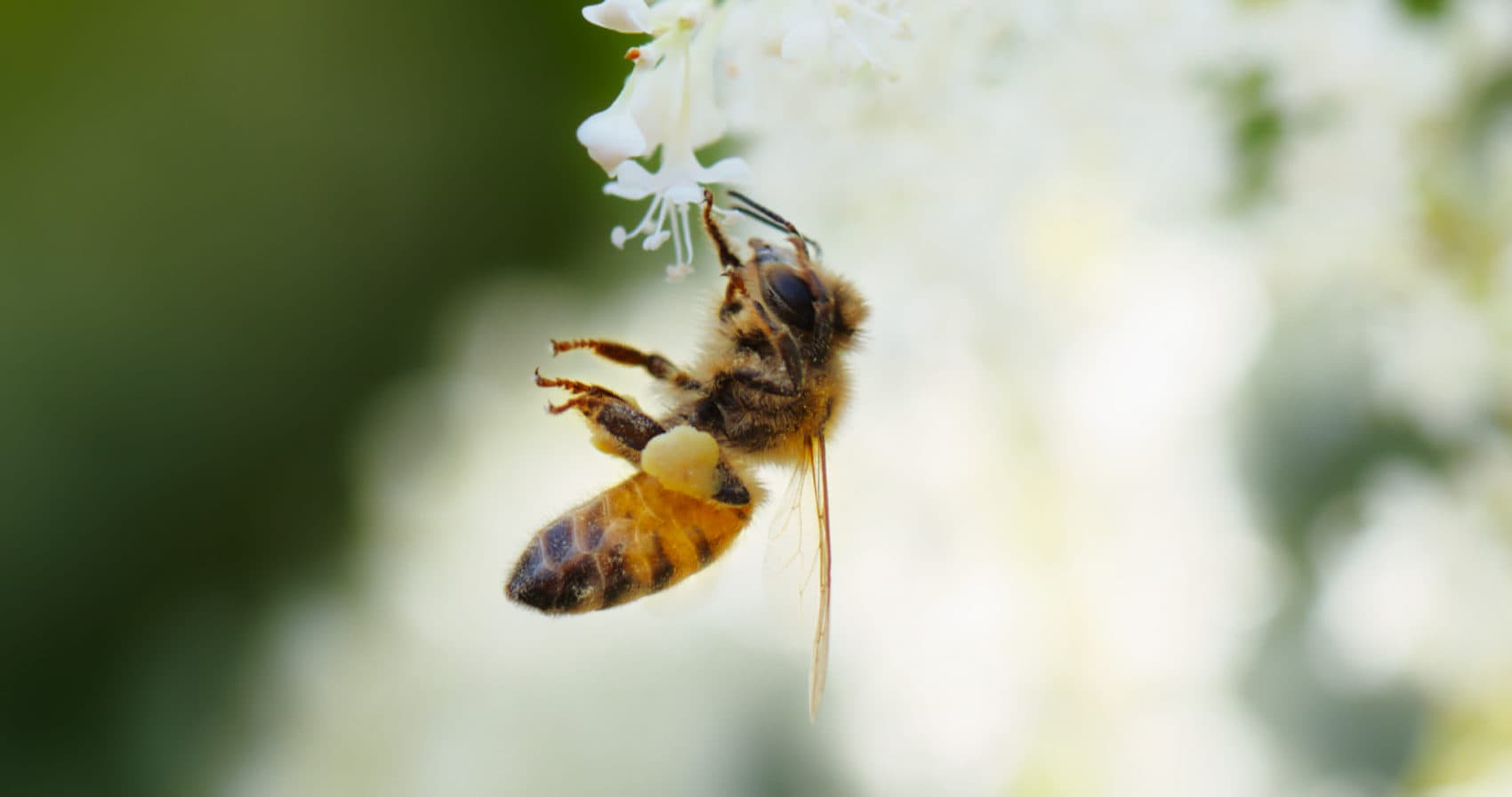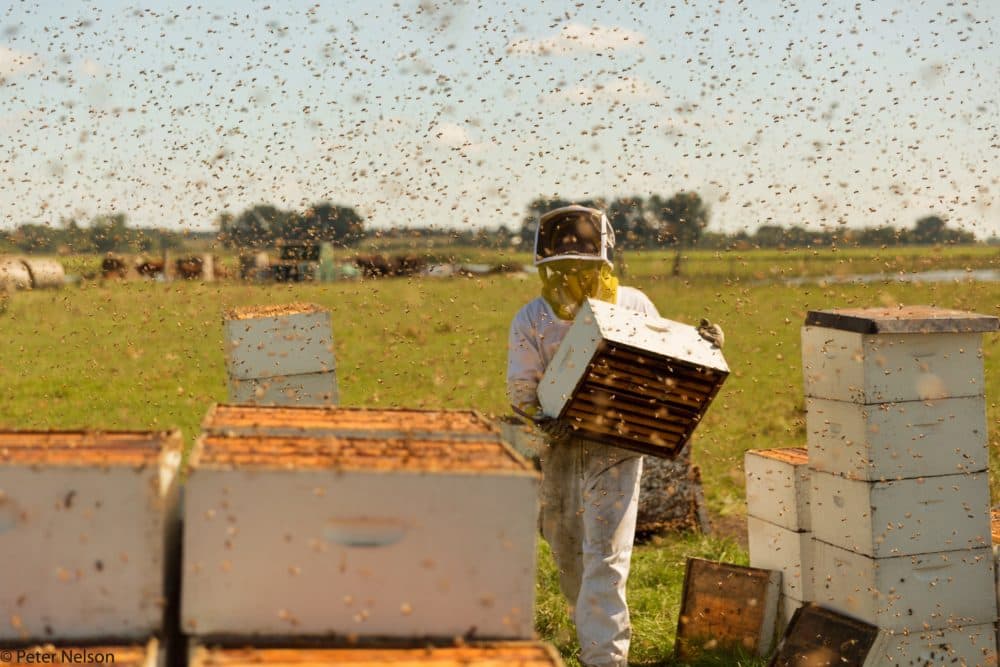Advertisement
Bees Are In Trouble. Here's How You Can Help

Honeybees are dying.
Decimated by Colony Collapse Disorder in the mid-2000s, bees remain under assault from pesticides, climate change, mites and habitat destruction. Between 2014 and 2017, about a quarter of bees in the nation's commercial colonies died each winter, significantly higher than the 15% previously considered normal.
Massachusetts Attorney General Maura Healey is so concerned about the declining health and numbers of bees in the state that she's co-sponsored a bill to restrict the sale of pesticides called neonicotinoids, which are especially devastating to bees and other pollinators. Without bees, local crops like apples and cranberries would fail, as well as national crops like almonds.
Filmmaker Peter Nelson’s new documentary, "The Pollinators," which had its East Coast premiere at the 2019 Boston Independent Film Festival, explores the plight of both honeybees and commercial beekeepers.
Nelson, the film’s producer, director and director of photography, calls the bee situation an “environmental crisis that threatens not only our millions of honeybee hives but one out of every three bites of food Americans eat.”
I spoke with Nelson about the film, and about how we can help our local bees. The following conversation has been edited for length and clarity.
Do people have a lot of misconceptions about bees?
Oh yeah. A lot of people have been stung by a yellow jacket, which they think is a bee, but it’s actually a wasp. Honeybees die when they sting, so if a person has had that experience of being stung multiple times it's usually a yellow jacket. I think people are sort of afraid of stinging insects, and I always encourage people to just look at bees for the beautiful creatures that they are.
Why did you want to make a film about the commercial bee industry?
Most people don't know that beekeepers move honeybees around the country and the scale of it. And this is a result of the changes in United States agriculture — the growth in the size of farms.
Do other countries have a different relationship with bees and other pollinators?
The scale of agriculture is so different here relative to much of the rest of the world. For example, the largest beekeeper in France has maybe 3,000 hives, which is a lot. But the largest beekeeper in the U.S. has about 100,000.

The problems are a lot of the same ones, although Europe has a very different approach to the introduction of chemical pesticides and fungicides into the environment, and that's something we talk about in the film. In Europe they follow the “precautionary principle.” That means when you're introducing a chemical, you test it in the field extensively before you use it. And it sounds like common sense, but here — because of the way the testing is done, the rules that exist and the power that the chemical companies have — they say, "Let’s use it and then figure out problems afterwards." And it's very hard to pull it back later.
You say that agriculture in the United States is a result of our food choices. What should we eat to help honeybees?
One of the very simple things that people can do is buy local honey. They can support their local beekeepers, get to know them, and that often is an entree into supporting local agriculture and smaller, organic farms.
My intent was to make this film very actionable because, while the situation is dire, I didn't want to leave people feeling helpless and hopeless.
What else can we do?
Little things, like window boxes and small gardens with native plants that offer forage for bees, can really add up. And eliminating pesticides and herbicides is something everybody can do, or eliminating your lawn entirely. I'm not totally anti-lawn but lawns often are like a food desert for bees. People don't realize the ramifications of having a lawn service come in and spray herbicide on your lawn and kill all the dandelions. Dandelions are actually a great early pollen source for honeybees.
The film shows some striking scenes of mass bee deaths. You keep bees yourself; have you ever experienced die-offs in your own colonies?
Yeah, absolutely. I only have three hives right now so I’m not on the scale of these commercial beekeepers, because they're encountering pesticides and fungicides on a level that we don't have where I live. Most of the problems that I've had have been with parasites like Varroa mites — that’s a big problem for all beekeepers. But this is the first year in probably five or six that all my hives survived the winter. So that’s good.
I have to ask about the smoke. Why are beekeepers always puffing smoke around beehives?
A lot of people ask me that question. It calms the bees — it makes them think that there's a forest fire coming, so they go into the core of the hive and gorge themselves with honey. It also masks the pheromones of other bees. So it sort of distracts them [and] it makes it a little harder for them to sting.
How are audiences reacting to the film?
People love this story because they can connect to it. Most people know that there's a problem with the bees, but they don't know what the problem is, and — you know — it's not just one problem. So people have a lot of questions. I get this all the time — you sit next to somebody on a plane and they ask what you do. Pretty soon you’re talking about bees and an hour later you're still talking about bees.
